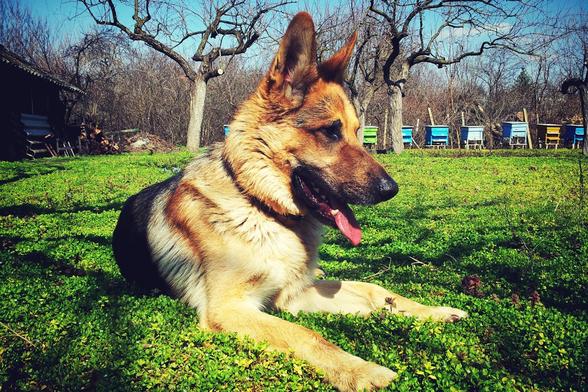The German Shepherd, a breed revered for its intelligence, courage, and loyalty, holds a unique place in canine history.
Originally bred in Germany for herding sheep, these dogs quickly became celebrated for their versatility, rising to prominence as trusted working dogs in fields like search and rescue, law enforcement, and even military service.
German Shepherds’ legacy as guardians and companions has solidified them as one of the most popular dog breeds in the world.
Table of Contents
ToggleA Closer Look at German Shepherd Loyalty
German Shepherds are exceptionally loyal animals, often forming deep bonds with their owners. This loyalty manifests as a fierce protectiveness; a well-trained Shepherd will do almost anything to keep their loved ones safe.
This breed thrives in environments where they can be close to their families, showing unwavering devotion that lasts a lifetime. Their loyalty is not just a trait but a deeply ingrained instinct, a part of their essence that has been cultivated over generations.
Why German Shepherds Excel in Training
Renowned for their intelligence, German Shepherds rank among the smartest dog breeds. Their ability to learn complex commands quickly and retain training is remarkable, making them ideal for roles that require quick decision-making and adaptability.
They respond well to structured training programs and often excel in obedience trials. This natural intelligence, combined with their eagerness to please, makes German Shepherds highly trainable, though they also require consistent mental stimulation to remain engaged.
The German Shepherd’s Protective Nature
Protectiveness is a hallmark of the German Shepherd temperament. With a natural instinct to guard, these dogs are quick to assess potential threats and respond accordingly.
This trait makes them excellent watchdogs, but it also demands responsible ownership to ensure they react appropriately in various situations.
Early socialization is crucial to channel this protectiveness effectively, helping them distinguish between friend and foe.
Social Behaviour Around Family and Strangers
While German Shepherds are affectionate with family, they can be reserved or aloof around strangers. This reserved nature does not imply aggression but rather a cautious approach to unfamiliar people.
Given time and proper socialization, they may warm up, but they’re generally not the type to eagerly greet strangers. This balance of affection and reserve makes them excellent guardians who are friendly without being overly trusting.
Strength, Agility, and Athleticism
German Shepherds are known for their muscular build, agility, and remarkable endurance. They are highly athletic and require ample space to exercise their natural agility.
This physical prowess is not just aesthetic but functional; it allows them to perform tasks that require speed, strength, and dexterity.
Whether herding sheep or chasing after a frisbee, German Shepherds embody a powerful combination of form and function.
Temperament in Varied Environments
A German Shepherd’s temperament can vary depending on the environment. At home, they tend to be calm and collected, often exhibiting a watchful eye over family members.
Outdoors, their curiosity and energy take over, prompting them to explore and interact with the environment. In social settings, their behaviour is often determined by early training and exposure; well-socialized Shepherds adapt well, while those lacking this exposure may appear cautious or standoffish.
Interaction with Other Animals: Friend or Foe?
German Shepherds generally get along well with other pets when properly socialized from a young age. However, their natural herding instincts can sometimes make them overly dominant or territorial around smaller animals.
Training ensures they interact appropriately with other dogs and pets, establishing boundaries to foster harmony in multi-pet households. This ability to adapt can transform them from cautious protectors to friendly companions.
Energy and Exercise Needs
German Shepherds are high-energy dogs that require consistent exercise to stay healthy and happy. They enjoy activities that challenge both their minds and bodies, such as agility training, hiking, and obedience exercises.
Without adequate physical and mental stimulation, they can become restless or even develop behavioural issues. Regular exercise is essential, not just for their physical health but to keep their sharp minds engaged.
Temperament Through Life Stages: From Puppyhood to Senior Years
German Shepherds’ temperaments evolve as they age. Puppies are typically energetic, curious, and playful, while adult German Shepherds exhibit a steadier, more focused demeanour.
They may become calmer as they enter their senior years, yet their protective instincts and loyalty often remain unchanged. Understanding these life-stage transitions helps owners provide the best care and training suited to each phase.
Managing the Strong-Willed German Shepherd
Though intelligent and loyal, German Shepherds can also be independent and strong-willed, requiring a firm but fair approach to training.
They benefit from a structured environment and a confident owner who can establish clear boundaries. Without this structure, they may attempt to assert their own will, which can lead to behavioural challenges. Patience, consistency, and a commitment to ongoing training are essential to managing this breed effectively.
Conclusion
Owning a German Shepherd is a rewarding experience, filled with companionship, loyalty, and shared adventures. Their unique temperament and traits make them more than just pets—they become trusted family members and protectors.
German Shepherds are a breed that brings unparalleled loyalty, intelligence, and devotion, creating bonds that truly last a lifetime.






